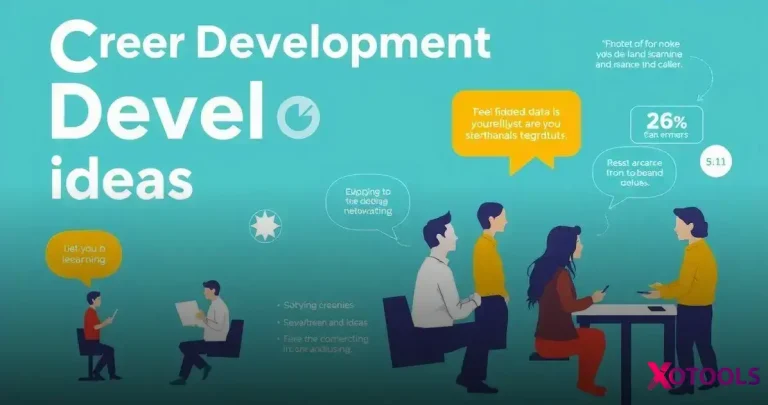ADVERTISEMENT
Career development ideas are crucial for anyone looking to advance in their profession.
By exploring the various strategies for growth, one can unlock new potential and opportunities.
This article will delve into effective ways to enhance skills, set achievable goals, and build a fulfilling career path.
Understanding the Importance of Career Development
Understanding the importance of career development is key to achieving long-term success. It is not just about moving up the ladder; it’s about improving your skills and enhancing your knowledge. When you take steps to develop your career, you open doors to new opportunities that fit your interests and goals.
Career development helps you stay relevant in a fast-changing job market. By continuously learning new skills and gaining experience, you become more valuable to employers. This process can lead to promotions, salary increases, and job satisfaction.
Moreover, focusing on career development encourages self-reflection. It allows you to assess your interests and strengths, aligning them with your career path. By being proactive about your growth, you are more likely to create a rewarding, fulfilling career.
Identifying Your Career Goals
Identifying your career goals is the first step in your journey toward success. Start by reflecting on what excites you. Think about the tasks you enjoy and the subjects that interest you. This will help you understand what type of job or career path you might want to pursue.
Next, consider your strengths and skills. Ask yourself which abilities you are most proud of and how you can use them in your future job. Knowing your strengths can guide you to set clear and achievable career goals that match your talents.
It’s also helpful to set both short-term and long-term goals. Short-term goals can be simple, like completing a course or gaining experience through internships. Long-term goals might include aiming for a specific position or level in your career. By breaking down your goals, you make them more manageable and reachable.
Exploring Skill Development Options

Exploring skill development options is essential for anyone looking to grow in their career. One effective way to enhance your skills is through online courses. Many platforms offer flexible learning opportunities that fit your schedule. You can choose courses that match your interests and career goals, whether it’s marketing, coding, or graphic design.
Another option is to attend workshops or seminars. These events often provide hands-on experience and can connect you with industry professionals. Meeting others in your field can also inspire you and introduce you to new ideas that can benefit your career.
Don’t forget about the value of self-study. Reading books, watching educational videos, and listening to podcasts are great ways to learn at your own pace. Combining different methods can help you build a well-rounded skill set and keep you motivated on your career path.
Networking for Career Advancement
Networking for career advancement is a powerful tool in today’s job market. It means connecting and building relationships with people in your industry. By attending events, joining groups, or even using social media, you can meet others who can help you along your path. These connections can lead to job openings, mentorships, and collaboration opportunities.
One way to network effectively is to be genuine and show interest in others. Ask questions and listen to their experiences. This creates a positive impression and can lead to stronger connections. Remember, networking is not just about what you can gain; it’s about building a community where everyone can benefit.
Finally, follow up with the people you meet. Send a friendly email or connect on social media. Keeping in touch can open doors for future opportunities. Regular communication helps to maintain your relationships and shows that you value the connection you’ve built.
Utilizing Mentorship for Growth
Utilizing mentorship for growth can be a game changer in your career. A mentor is someone with more experience who can guide you and share valuable insights. They can help you navigate challenges, set goals, and develop the skills you need to succeed. Finding a mentor in your field can provide you with unique perspectives that you may not have considered before.
A good mentor also offers support and encouragement, which is important for personal growth. They can help you overcome self-doubt and motivate you to keep pushing towards your goals. By discussing your challenges and achievements, a mentor can help you see your progress and areas for improvement.
To make the most out of your mentorship, be open to feedback and willing to learn. Prepare questions or topics to discuss during your meetings. By being proactive, you can create a meaningful relationship with your mentor. This partnership can lead to new opportunities and help you grow both personally and professionally.
Setting Up a Personal Development Plan

Setting up a personal development plan is a great way to track your growth and success. Start by identifying your goals. What skills do you want to improve? What achievements do you wish to reach? Write down your goals clearly, as it gives you a focused direction to work toward.
Next, break your goals into smaller, manageable steps. This makes it easier to see your progress over time. For example, if you want to learn a new skill, outline the resources you need and set a timeline. Small steps lead to big achievements, and having a plan keeps you motivated.
Finally, review your development plan regularly. Check in with yourself to see how you’re doing and if you need to adjust your goals. Reflecting on your progress helps you celebrate your successes and identify areas for improvement. A personal development plan is a living document that should grow with you.
Career Development Ideas: Evaluating Your Progress and Achievements
Evaluating your progress and achievements is a vital part of personal and career growth. Regularly check your goals and see how far you’ve come. Reflect on the skills you’ve gained and the challenges you’ve overcome. This helps you understand what works and what needs improvement in your development plan.
As you review your progress, consider keeping a journal or log. Write down your accomplishments, big or small. Celebrating these achievements boosts your confidence and motivation. It also reminds you of the hard work you put in and encourages you to keep moving forward.
Finally, don’t be afraid to adjust your goals based on your evaluations. If you find an area where you excel, you might want to set more challenging objectives. On the other hand, if certain goals are too difficult, it’s okay to scale back. The key is to remain flexible and focus on continuous improvement on your journey.
Setting clear career goals helps you map out a path for your future. Start by thinking about what you want to achieve in your career. Do you wish to earn a promotion, change fields, or develop new skills? Knowing your goals provides direction and helps you stay focused on your growth.
Once you have your goals, break them down into smaller, achievable steps. This makes it easier to reach each milestone along the way. For example, if your goal is to learn a new software program, set aside time each week to practice. Completing these smaller tasks boosts your confidence and keeps you motivated.
Remember to review and adjust your goals as needed. Life can change, and so can your interests or circumstances. Regularly checking in on your progress allows you to see how far you’ve come and make any necessary changes. This flexibility ensures that your career development plan stays aligned with your evolving aspirations.







